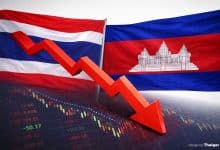Thai Board of Trade caught in tariff crossfire over Uyghur issue

Thailand’s business leaders are urging firms to stay agile amid fears that the ongoing Uyghur issue could disrupt trade talks.
Sanan Angubolkul, chairman of the Thai Board of Trade, warned it’s too early to predict the fallout but said businesses must adapt to survive.
Companies are being urged to make the most of Thailand’s 16 free trade agreements (FTAs) with 23 countries, slash costs, embrace technology, and find fresh markets to avoid overreliance on risky ones.
Sanan stressed the need to accelerate FTA expansion to lure foreign investors, pointing to Vietnam’s success in using trade deals to boost its appeal.
He called for swift negotiations with key markets like the EU, where an FTA with Thailand is on the table, and the Middle East and South America, where demand for Thai goods is soaring.
Despite global uncertainty, Thailand’s exports are booming. In the first two months of 2024, exports hit US$52 billion (1.76 trillion baht), up 13.8% year-on-year—the eighth straight month of growth. The surge is fuelled by soaring demand from Switzerland (+236%), India (+157%), China (+22.4%), and the US (+18.2%).

Government support, particularly from the Commerce Ministry, has played a crucial role in helping Thai businesses stay competitive, innovate, and keep Thai products in demand worldwide.
But not all sectors are thriving. Agricultural exports dipped 1.6%, while mineral and fuel products slumped 11.5%. And with the US set to announce new tariffs on April 2, concerns are mounting over potential impacts on Thai industries, including electrical goods, cars, machinery, and steel, Bangkok Post reported.
Last week, Thailand was warned that the potential deportation of Uyghurs could throw a spanner into delicate free trade talks with the European Union (EU), sparking fears of an international trade storm.
Concerns were raised on how these actions might jeopardise Thailand’s economic relationships and its bid to join the Organisation for Economic Cooperation and Development (OECD).
So far, Washington hasn’t imposed direct measures on Thailand, but businesses are bracing for what could come next in the ever-shifting global trade landscape.
Latest Thailand News
Follow The Thaiger on Google News:


























